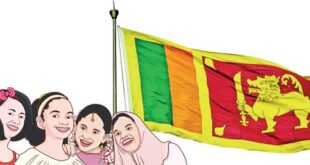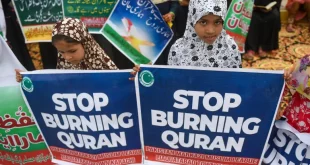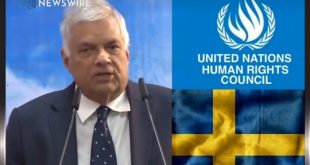The New Year is just a week away and it promises little hope for a better tomorrow or a world without conflicts, a world where the common good will prevail over self-interest. This is no attempt to paint a bleak picture of the future, but only an analysis of the year that is bidding farewell and would go into history as another year that failed to see world peace.
Despite the gloom of a global economic crisis, 2009 began with much hope with Barack Obama replacing war-hungry George W. Bush as the president of the United States. But as 2009 comes to a close, Obama appears to be more a sheep in Bush clothes than an antithesis of the war president who was responsible for the destruction of Iraq and the deaths of 1.3 million Iraqis since March 2003.
One year on, Obama’s presidency, however, appears to be a craftily-built castle of illusion. The castle attracts the onlookers, but in reality it is a snare — a spider’s web for the unsuspecting insects.
The Nobel Committee which awarded the Peace Prize to Obama was also lured by the castle. However much, those in the know protested, the committee members stuck to their position and even justified their decision saying Obama was picked because he gave hope to a world without hopes.
Indeed, hope was the word that came to be associated with Obama as he assumed office on January 20. Whether he spoke at home or abroad, his words dished out hope in abundance and he became a popular world president. In fact, the 2008 US Presidential election was seen as an election to choose a world president. But as 2009 draws to a close, those who pinned hopes on Obama are a disappointed lot. The wars in Iraq and Afghanistan continue. Reports also indicate that US troops directly or indirectly wage wars in Somalia and Yemen.
Reports are also emerging that US troops are involved in combat operations in Pakistan, besides the US drone attacks that have killed more than 400 Pakistani people, most of them innocent civilians.
In defence of Obama, his supporters may point to the deadlines that he has set to withdraw troops from Iraq and Afghanistan. They may also cite the deadlines he set to close down America’s gulag-like prisons in Guantanamo Bay. They may also talk about Obama’s opposition to torture. But these are all goals which are yet to be achieved. Often what happens is when the deadlines approach, new deadlines are set, thus keeping hopes alive in the hearts of the peace-loving people.
As this article was being written, news broke out that Obama might not be able to keep his promise of closing down the Guantanamo Bay by December 31.
In the coming year, Obama has set a date to end the United States’ bloody, costly and illegal war in Iraq. On August 31, 2010, the US is expected to end all combat operations in Iraq, though the final withdrawal of the troops is set to take place by the end of 2011. Whether these deadlines will be met is anybody’s guess, given the secret schemes that guide the US policy on West Asia. Perhaps, a part of these schemes was to make 2009 a year of harvest for America in Iraq. Arm-twisting and manipulation of Iraq’s legislators by the United States have led to the sale of Iraq’s oil fields to multinational oil giants. Oil was one of the objectives of the US war on Iraq and Washington is now getting it.
As 2009 winds up, we could heave a sigh of relief that the much-speculated war on Iran did not take place. During the final days of the Bush era, the talk was that either Israel or the United States would launch strikes on Iran to neutralize the Islamic Republic’s nuclear programme. That this war did not take place indicates not so much any pacific inclination of the Obama administration but a realistic assessment that even a limited war on Iran would be disastrous to America because of Teheran’s military capabilities and strategic advantages.
Moves to compel Iran to halt its nuclear programme by the United States and other permanent members of the UN Security Council — all possessing thousands of nuclear weapons — also came a cropper in 2009. Iran announced significant progress in its uranium enriching programme and played its diplomatic cards skillfully making use of Russia’s and China’s blow-hot-blow-cold relations with the United States to its advantage.
Another area where hope meant much at the beginning of the year and very little at the end is Palestine. Obama in his Cairo speech in June to the Muslim world held out much promise to the Palestinian people, but as the year ends, the Palestinian people in the Gaza Strip continued to live under siege with little or no basic facilities such as access to food and sanitation. In the West Bank, Israel continues its illegal settlement building on occupied Palestinian land although it has announced a ten-month freeze on all settlement activities to give the US some excuse to side with Israel in the century-old dispute. The coming year does not hold out much promise to the Palestinian people. With Israel determined to annex the whole of Jerusalem, a city sacred to all three monotheistic religions, instead of respecting Palestinian wishes to make East Jerusalem as the capital of their future state, the region is likely to see more bloodshed in 2010.
The passing year also showed China emerging as an economic powerhouse and military superpower. Its stamp on world affairs was felt in a much bigger way this year than the previous year — with Beijing strengthening military ties with Central Asian countries and taking measures to ensure an uninterrupted supply of much-needed oil to its humongous industrial base. China’s larger than life presence in Sri Lanka, Pakistan, Bangladesh, Myanmar and the Maldives in Asia and in oil producing Sudan and Angola in Africa has also caused concern in the United States and India. The coming year may see the US also increasing its diplomatic activities to woo these countries which have fallen into the sphere of China’s influence.
China’s rise has also caused concern in Russia though the two countries are moving towards forming a military alliance to counter NATO. Russia is envious of China’s rise because it feels that the world’s number two position belongs to it. However, both China and Russia have cooperated well to make the Shanghai Cooperation Organisation a platform to form a new military alliance to rival NATO. Though it is expected that China-Russia military cooperation may give rise to at least a softer version of the Cold War with the West, economic compulsions will make sure that no disagreement among them leads to a major conflict. If 2009 can be termed a landmark year for Sri Lanka for its defeat of terrorism, for Pakistan the year is indeed an annus horribilis. Millions of Pakistanis were made homeless and thousands died when the United States pushed Islamabad to launch an all-out war against the pro-Taliban militia or the so-called Pakistan Taliban. The presence of US Blackwater mercenaries and continuous bomb attacks in Peshawar, Lahore, Islamabad, Rawalpindi and other areas have made Pakistanis question whether there is an international conspiracy to destabilize their country. The Pakistani’s believe that India and the United States are hand in glove in their bid to de-nuclearise and Balkanise Pakistan. Whether there will be some respite for Pakistan in the coming year is a moot point.
While Pakistan was burning as a result of Obama’s war, its giant neighbour and arch rival India saw the Congress Party return to power. For India, 2009 dawned against the backdrop of the Mumbai terror attack. But as the year ends, the political turmoil in Andhra Pradesh over New Delhi’s decision to carve a new Telangana state out of it is threatening to spread to other states where separatist tendencies exist.
Nothing more could symbolize the hopelessness of 2009 than the recent climate-change summit in Copenhagen. As the 12-day UN conference ended, there was little hope for the poor nations and climatically vulnerable countries. The failure to seal a binding climate deal at Copenhagen is licence to kill the planet. It allows developed countries to avariciously defend their right to ruin the planet as they move along the greed-ridden path to self-destruction which they call industrialization or economic development.
The coming year, if not the year after that, is likely to see climate-change-driven disasters — such as food crisis and outbreaks of disease. Didn’t we see AH1N1 this year?

 Sri lanka Muslims Web Portal Diversity and Inclusiveness
Sri lanka Muslims Web Portal Diversity and Inclusiveness



